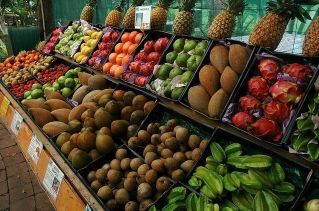Antioxidant Definition – What are antioxidants?
If you looked for an antioxidant definition in the dictionary, you’d probably find something along the lines of:
- antioxidant: a substance that inhibits oxidation or inhibits reactions promoted by oxygen or peroxides.
However, if you’re like me, you want something a little more extensive than the antioxidant definition listed above.
The word “antioxidant” is thrown around by everyone these days, especially if the topic in question happens to be fruits and vegetables. Every day there’s an article in the newspaper about a new antioxidant that supposedly prevents cancer if you get enough of it. Even antioxidant juices keep growing in popularity.
However, to really reap the benefits of antioxidants, it’s worth taking the time to understand them properly.
What are antioxidants?
As you probably guessed, the “anti” means against or in opposition to. To understand antioxidants, it will help to learn about what they oppose and fight against.
I find that an easy way to understand antioxidants is to think of them as your own personal army. Antioxidants surge and scout around your body, looking for anything suspicious. When anything dangerous pops up (such as a cancerous growth), the antioxidants ride into battle and (hopefully) win the fight. Check out How Do Antioxidants Work for more information on how they do their job.
Unfortunately, antioxidants are not guaranteed to win the battles they fight. To survive, they need constant reinforcements. Every time you eat an apple or drink a tasty beetroot juice, you are sending reinforcements in. An antioxidant diet is perfect for this.
Why send reinforcements in the first place?
As you sit there, reading this page, think of all the thousands (if not millions) of processes occurring in your body right now. You have the obvious ones such as your breathing, blinking and the heart that pumps without you having to think about it. Then you have thousands of others, most of which you’re probably not even aware of.
Oxygen is the key that gives life to these processes. Unfortunately, the same thing that gives life to your bodily processes can create dangerous side effects, which then lead to cell damage and chronic disease.
Oxidants (also known as “free radicals”) can also enter through the body through a variety of external sources. External sources include exposure to the sun, pollution, alcohol, cigarettes, junk food, stress and more.
Have you ever seen a rusty car? They’re usually falling to pieces, especially when they’ve been left in the same condition for years on end. In a similar way, oxidation inside your body creates “rust” on your cells, causing them to breakdown. The oxidants or free radicals produced by this process then attack healthy cells, including DNA, proteins and fats. This compromises the immune system, speeding up aging and leading to a variety of diseases including cataracts, cancer, heart disease and arthritis.
Enter the Antioxidant Army!
Here’s a better antioxidant definition – antioxidants are anti-oxidation agents. They neutralize dangerous oxidants by binding together with them, minimizing their destructive power. They also repair cell damage caused by the rampaging enemy army of free radicals.
Some antioxidants are actually produced within our bodies while others are found in foods.
If you’re interested in maximizing your antioxidant intake (a great goal), stick with fruits and vegetables. It’s been said that antioxidants give plants their color, so pick things with a deep, dark, rich color.
Unfortunately, cooking tends to destroy things like antioxidants, so where possible, eat your fruit and vegetables raw. This way, you’ll maximize the nutritional content.
Use juicing to get loads of antioxidants into your body. Check out the Juicing Recipes for ideas and the Benefits of Juicing to learn more about specific fruits and vegetables.
A simple way to think of an antioxidant definition is this – plants.
If you want more antioxidants, eat lots of antioxidant rich foods.


